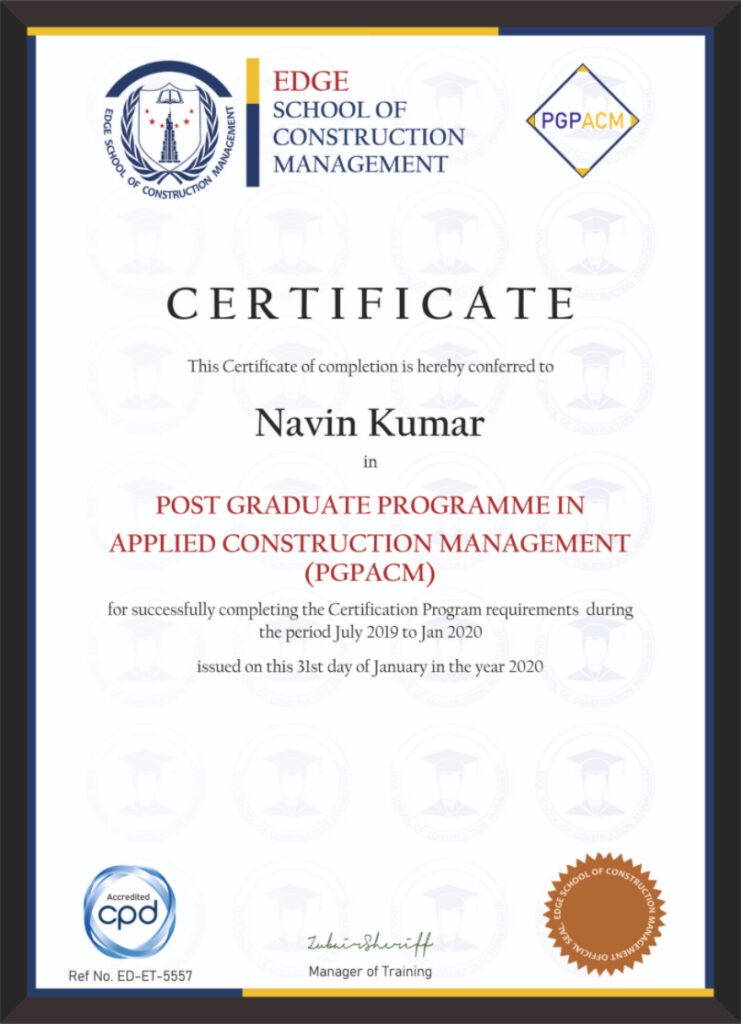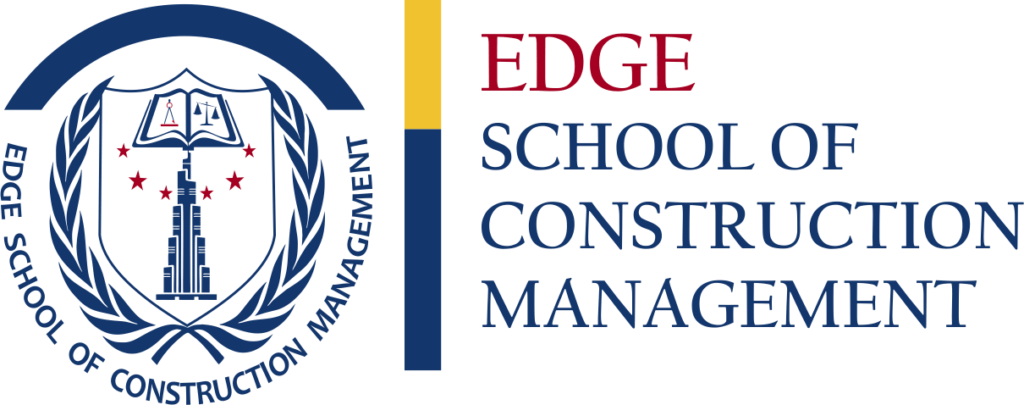POST GRADUATE PROGRAMME IN APPLIED CONSTRUCTION MANAGEMENT (PGPACM)
POST GRADUATE PROGRAMME IN APPLIED CONSTRUCTION MANAGEMENT (PGPACM)

CAREER PROSPECTS
A fresh engineer is prepared to handle responsibilities of Engineer – Execution, Planning, Estimation, and Quality. You can become eligible for Managerial positions within 1 to 3 years of relevant exposure which otherwise takes 12-15 long years.
DURATION
Its a 4+2 months Programme with classes on weekdays. Classes usually will be for 2-4 hours everyday including theory and lab practice.
ELIGIBILITY
1. This is one of the best courses after civil engineering & architectural studies, and hence requires an individual to be BE / BTech Civil Engineering / B.Arch. from AICTE recognized university having min. 50% overall marks. Final year Civil Engineering students can also apply.
2.For architectural candidates, min. 1 yr. of experience is necessary.
HOSTEL & ACCOMMODATION
Edge provides full support in getting a good accommodation in reasonable budget in the area in the close proximity of the institute. We have tie ups with boys and girls hostels which are within 2 Km distance. Most of the students prefer PG (paying guest) accommodation. Institute helps all to get such accommodation as well. Cost of living (food and stay) in Hyderabad will charge approx.. 5000 to 8000/- a month. Ample options are available to get variety of food in nearby hotels and mess.
PLACEMENT
This is one of the most effective certification courses for civil engineers that open up placement opportunities in various areas of Construction Project Management like Billing & Estimation, Planning, Execution or QA-QC. At EDGE, our attempt is to maintain 100% placement record. Students either get placed –in campus or off campus from our side or earn job by themselves. Advance knowledge of Construction Management, Project Management, related software and soft skills help students get easily placed. It’s not only a certification course, but moreover a rigorous professional training to build competencies. Salary packages are completely based on the calibre of students, their attitude and technical knowhow. These are the reasons why EDGE’s PG in construction management is among the top construction management courses in India.
WHY PGPACM AT EDGE?
PGPACM course is a incubator for a graduate to become professional and hence all systems and policies are set accordingly. Students are informed to refer the academic calendar. Entire program consists of around 180 days including coursework & assignment days, national holidays and Sundays. No other holidays are granted to students. Students shall maintain 90 per cent attendance to be eligible to pass each level and to get full benefit of the program and final certificate. Students may avail leaves on account of genuine reasons such as passport interview, major illness, and marriage of real brother/sister only. Leaves shall be applied 3 days in advance and get sanctioned. Student shall cover portion missed during leave period on his own responsibility. Sanctioned leave does not mean consideration in attendance. Attendance is a physical presence during conduct of session.
CURRICULUM
The training of professionals as part of the Construction Management program focuses on the following areas: project management, construction management, contracts management, construction quality, safety and equipment management, supply chain management of construction projects, modern construction materials and technologies, computer applications in construction (MS Project, Primavera), and building information modelling (BIM) for the construction industry.
CORE TOPICS IN CONSTRUCTION MANAGEMENT COURSE:
Introduction To Construction Management
Quantity Surveying, Estimating And Bidding Procedures
Construction Contracts & Construction Law
Construction Scheduling
Construction Cost Planning & Control
Project Monitoring For Quality Control And Safety
Dispute Resolution Techniques In Construction
Procurement Management
Innovation In The Construction Industry
Risk Management
UPON COMPLETING THE COURSE STUDENTS WILL BE ABLE TO
Define And Describe Construction Processes And Various Engineering Roles Involved
Describe, Interpret, And Differentiate Between Project Delivery Systems In Construction Projects
Select And Justify Contract Types For Each Project Delivery System Explain And Develop Work Breakdown Structures Identify And Develop Work Packages And Activities
Describe, Explain, And Compare Various Scheduling Techniques;
Develop Construction Plans And Schedules;
Calculate And Synthesize Construction Estimates
Describe The Materials Management Process
Identify Construction Safety Hazards And Corresponding Solutions
Categorize Construction Operations, Equipment, And Materials; And Develop, Integrate, And Apply Construction Operations And Processes Models.
Identify The Different Design Stages In A Project Develop Reporting Procedures Such As Monthly Report, Quality Records, QA/QC Reports, MIS, Inspection Reports Write & Explain Minutes Of Meetings, Progress Charts, And Presentations.
Understand BIM Basics & The Benefits Describe How BIM Can Be Used As A Communication And Collaboration Tool, And Its Contributions To Scheduling, Estimating, And Facility Management.
Explain The Process Of Implementing BIM And How BIM-Based Designs For Structural, Mechanical, Electrical, Plumbing, Fit Into The Overall Construction Document Fabric.
CORE SYLLABUS
SUB-MODULE 1
QUANTITY SURVEYING FUNDAMENTALS
• Introduction to Engineering project including project cycle & bidding documents.
• Methods of measurement of the works.
• Quantities surveying by manual calculations for the following different works
• Earthworks Calculations
• Calculation of Excavation Quantities for Spread Footings & Mat/Raft Foundations
• Calculation of Soil Treatment Quantities
• Calculation of Backfilling Quantities
• Concrete works Calculations (PCC & RCC)
• Calculation of Footings Concrete Quantities
• Calculation of Tie Beams Concrete Quantities
• Calculation of Column neck Concrete Quantities
• Calculation of Slab on Grade Quantities
• Calculation of RC Core Wall Concrete Quantities
• Calculation of Retaining Wall
• Calculation of U/G Water Tank/Sump Quantities
• Calculation of Floor Columns Concrete Quantities
• Calculation of Floor Beams Concrete Quantities
• Calculation of Floor Slabs(Cast-in-situ & PreCast Hollow Core Slab)
• Calculation of Staircase, Ramps & Lift Core Concrete Quantities
• Masonry works Calculations
• Calculation of Brickwork for Internal, External, Parapet & Boundary Walls Quantities
• Plastering works Calculations
• Calculation of Brickwork Plastering, Wall Plastering & Ceiling Plastering Quantities • Tiling works Calculations • Calculation of Floor Tiles, Dado Tiles & Wall Tiles Quantities • Thermal & Moisture Protection works Calculations
• Membrane Waterproofing Quantities
• Vapour Barrier, Damp-Proofing Bitumen Paint Calculations
• Metalworks Calculations
• Internal & External Finishes Calculations
• Wood & Plastic works Calculations
• Doors & Windows works Calculations
• Painting works Calculations
• Glazing works Calculations
• Specialties works Calculations
• Mechanical works
• Electrical works
• Steel Calculations of Sub-Structure & Super Structure elements.
• Application on Engineering project (LIVE PROJECT)
SUB-MODULE 2–QUANTITY TAKE-OFF USING CAD & MS EXCEL
• Quantity take-off from CAD Drawings (Civil/Architectural).
• Preparation of Payment certificate.
• Bill of Quantities as per CSI Divisions.
• CAD & MS Excel Training.
• Variations & Claims
SUB-MODULE 3 – CONTRACTS ADMINISTRATION
• Introduction to construction project stages
• Overview of the Construction contracting methods, and contracts types.
• Tender Documents
• Types of Contracts
Introduction
• Introduction to this Course
Basic Concepts
• What is a Project?
• What is Project Management?
• Five Process Groups of Project Management
• Schedule and its Importance
• Critical Path Method for Scheduling
• Understanding a Gantt Chart
• Project Management Fundamentals
Introduction to Primavera P6
• Introduction to Oracle Primavera P6 PPM
• Primavera P6 Interface and Preferences
Enterprise Environment in Primavera P6
• Organizational Breakdown Structure
• Enterprise Project Structure
• Work Breakdown Structure
• Access Control in Primavera P6
Planning and Creating a New Project
• Planning your Project Schedule
• Understanding a Sample Project
• Creating a New Project in Primavera P6
• Project Window Options
• Total Float and Project Must Finish Date
Calendars
• Role of Calendars in Scheduling
• Adding and Assigning Calendars
WBS, Activities and Basic Formatting
• Creating WBS in Primavera P6
• Formatting Columns and Timescale
• Percentage Complete Types in Primavera P6
• Activity Types in Primavera P6
• Setting Defaults for New Activities
• Adding Activities
• Estimating Duration of Activities
• Adding Duration of Activities
Relationships and Scheduling
• Understanding Relationships
• Adding Relationships and Scheduling
• Understanding Scheduling Algorithm
Formatting, Sharing and Reporting
• Formatting Bars
• Group, Sort and Layouts
• Filtering in Primavera P6
• Printing, Exporting and Importing
• Reporting in Primavera P6
– Information technology development in AEC,
– Principles and advantages of this inovative approach,
– software support in BIM,
– 4D BIM – multidimensional planning of a construction process,
– 5D BIM – advanced methods for cost analysis, automated quantity take off,
– clash detection,
– Object cooperation in a BIM project lifecycle, roles of individual stakeholders and other integrated aspects
Course Outline
Principles of contracts
-Defining A Contract
-Elements Of A Contract
-Expressed And Implied Contracts
-Problems In Preparing And Managing Contracts
Contract preparation
-Stages Of Contract Preparation And Management
-Contracting Methods
-Developing The Scope Of Work
-Problems With A Badly Written Scope Of Work
-Decision Analysis Worksheet
-Evaluation Criteria
-Terms And Conditions
Contract types and strategies
-Fixed Price Contracts
-Cost Reimbursable Contracts
-Time And Material Contracts
-Payment Terms
The tendering stage
-Objectives Of Tendering
-Alternative To Tendering
-Tendering Procedures
-Tendering Objectives
-Invite Potential Bidders
-Tender Briefing
-Receiving And Opening Of Bids
-Recommendation Report
-Evaluation Of Bidders
-Pre-Qualification Criteria
-Invitation To Tender
Course Outline
- Hard Skills VS Soft Skills
- Self Performance – Work Performance – People Performance
- Self-Engineering – Elevate From Data Understanding To People Understanding
- Top 5 Must Have Soft Skills For Professional Engineers
Self Analysis Tools
- Group Activity
- Employability Skills To Make A Presence In Global Market
- Tips For Time And Self-Management
- Q&A Session With Feedback
Outcome of the course
- Understand How To Maximise Your Verbal And Visual Communication Skills
- Understand How To Speak Fluently And Confidently
- Learn How To Give Importance To Your Language To Create An Impact
- Learn Art Of Self-Management With International Tools
- Learn How To Heighten Your Personal Presence
- Insightful Information On How To Increase Performance
- Proper Understanding Of Mandatory Soft Skills
FEE AND ADMISSION
Fees can be paid in 3 installments. 40% of the total fee should be paid at the time of admission, 30% after one month of admission and remaining 30% after two months of admission.
Pay and Book your seat by paying ₹ 1000/- as registration fees. For course Fees, Kindly! Contact Us.
CERTIFICATE
Trainees earn the EDGE-SCOM Certification after completing the program requirements which are designed and developed in compliance with international standards and ongoing update based not only on the latest international principles and practices, but also field research first-hand experience, and in-depth knowledge of the market and the specific requirements of organizations.



